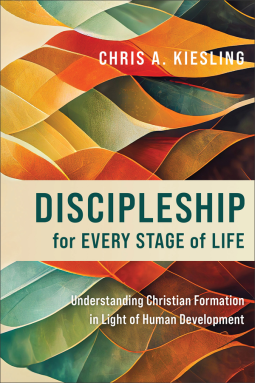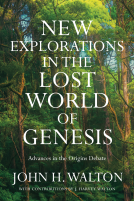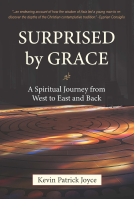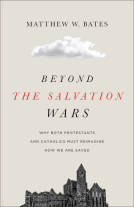
Discipleship for Every Stage of Life
Understanding Christian Formation in Light of Human Development
by Chris A. Kiesling
This title was previously available on NetGalley and is now archived.
Send NetGalley books directly to your Kindle or Kindle app
1
To read on a Kindle or Kindle app, please add kindle@netgalley.com as an approved email address to receive files in your Amazon account. Click here for step-by-step instructions.
2
Also find your Kindle email address within your Amazon account, and enter it here.
Pub Date 18 Jun 2024 | Archive Date 2 Jul 2024
Baker Academic & Brazos Press | Baker Academic
Talking about this book? Use #DiscipleshipforEveryStageofLife #NetGalley. More hashtag tips!
Description
Drawing on more than twenty-five years of experience teaching faith development topics in academic and local church settings, Kiesling assembles a toolkit that will help those in ministry think comprehensively about discipleship at every stage of life. Taking into account physical, cognitive, emotional, and social aspects of human development from infancy through older adulthood, Kiesling guides readers in making practical use of these insights in churches and educational settings.
Pastors, ministry leaders, and educators will benefit from this treatment, which brings cutting-edge findings from the social sciences into dialogue with Scripture, theology, and practical ministry.
Advance Praise
“By linking developmental theory with profound insights from biblical studies, theology, and spiritual formation, Chris Kiesling provides a thorough and inspiring picture of Christian discipleship across the life span. Filled with practical ideas for pastors, parents, clinicians, and educators, Discipleship for Every Stage of Life offers clear pathways for helping people of all ages encounter Jesus in all of life. This is my new go-to resource for connecting contemporary human development with the timeless wisdom of the Christian faith.”—David Setran, Price-LeBar Professor of Christian Formation and Ministry, Wheaton College
“Chris Kiesling insightfully indicates how Christian formation can take place within stages of human development. The author has a deep understanding of both Christian ministry and the various psychological dimensions of human development. Discipleship for Every Stage of Life is well-documented and engaging as Kiesling provides personal examples and stories that illustrate how Christian formation can take place in different developmental stages. This book will be an invaluable resource for those working in or preparing for Christian ministry. We strongly recommend it to anyone who wants to know how churches can most effectively minister to the formational and developmental needs of their members.”—Jack and Judith Balswick, retired senior faculty, School of Psychology and Marriage and Family Therapy, Fuller Theological Seminary
“Kiesling provides a comprehensive look at faith formation across the human development life cycle, weaving together social science and the science of human development with biblical and theological understanding. The result is a well-informed, thoughtful, and practical resource. Whether read by a parent or a pastor, this work will help inform and inspire the intentional faith formation of infants through senior adults.”—Colleen Derr, president, Eastern Nazarene College
“In this thorough engagement with lifespan development studies, Kiesling advances the work of interpreting the social sciences as a tool for pursuing the way of Christ. To that end, his call for Christians to grow in ‘moving from context to text’ is apt, and his demonstration of doing so is deft. Here is the fruit of careful research and decades of faithful discipleship ministry. Readers seeking to be informed will benefit significantly. Readers willing to be spurred on will benefit abundantly.”—John David Trentham, associate professor of discipleship and leadership, The Southern Baptist Theological Seminary; editor in chief, Christian Education Journal
“Discipleship for Every Stage of Life could be written only by a senior scholar who has rich life experience as both a minister and a Christian educator. Kiesling has spent decades integrating insights from secular life span development theory with biblical and theological principles. He brings these fields together without simply tacking a truth from human development onto a biblical teaching or simply baptizing developmental insights. His careful work provides ministers and Christian educators with a nuanced, comprehensive book to aid us in our work.”—Holly Allen, retired professor of Christian ministries, Lipscomb University; coauthor of Intergenerational Christian Formation; author of Forming Resilient Children
“Kudos to Chris Kiesling! Discipleship for Every Stage of Life is a treasure for academics and church leaders. He has filled an enormous gap in the literature for life span disciple making by combining insights from theology, theory, and practical ministry in a comprehensive and engaging text that will be helpful to present and future ministry leaders for years to come. Thank you, Dr. Kiesling, for recognizing that discipleship is a lifetime adventure!”—Chris Shirley, dean, School of Educational Ministries, Southwestern Baptist Theological Seminary
Available Editions
| EDITION | Other Format |
| ISBN | 9781540965943 |
| PRICE | US$27.99 (USD) |
| PAGES | 216 |
Available on NetGalley
Featured Reviews
 Reviewer 1281795
Reviewer 1281795
A good overview of spiritual formation for the lifespan, with lots to say about each of the aspects of human life
This was a fantastic survey of how we develop as a human being … and how that development intersects with our faith formation. Each chapter takes up a particular development stage, first introducing the current secular/psychological characteristics before illustrating how such understanding could be used to influence faith formation at that stage followed by a few very generic recommendations on how to implement that knowledge. Over all I though it was well done; although I found some chapters better done than others … and there is certainly the potential of conflict for those who come to this work with either a “progressive/secular” or “conservative/religious” perspective (especially within the chapter on adolescence and identity that seems to promote nature or nurture). In addition, I found a lot of the practical advice to be too generic to be easily adapted and used, so there is some effort and experimentation needed to find what might work for the reader. All of that said, over all this book worked for me despite any minor disputes with the material so long as you approach it with an open mind and willingness to entertain questions.
I was given this free advance reader copy (ARC) ebook at my request and have voluntarily left this review.
#DiscipleshipforEveryStageofLife #NetGalley.
 Yakub T, Educator
Yakub T, Educator
Chris Kiesling insightfully invites us to understand discipleship in every stage of human life from very early until we think it's too kate to be a disciple. He has a deep understanding thankful to his long journey ministry in teaching faith development in many local church and academic setting. I recommend you to learn from him in formational life of member of the church.
 Reviewer 726671
Reviewer 726671
I enjoyed the content and thought it was helpful. But it's probably written more on the technical side rather than being accessible for lay people like parents just interested in how to disciple their kids. So I guess it just wasn't what I was expecting or hoping for. It felt more like an academic textbook than something helpful I'd hand to a parent or a children's/family pastor. The content was good and helpful, just a little too dense and academic for my taste.
 Conrade Y, Reviewer
Conrade Y, Reviewer
What have life stages got to do with discipleship? How do human sciences affect spirituality? Is it legitimate to connect Christian formation with human development? These questions should pique the interest of Christians who want to see discipleship expand and be applied beyond the regular youth and adulthood age groups. By bringing together curiosity about human sciences and the theology of Christian Spirituality, author and professor Chris Kiesling has given us a compelling work that engages the development of Christian discipleship for every stage of life. Using his thirty years of learning about human sciences, he maintains that discipleship strategies should adapt to the person's human development stage. It is hoped that not only will that help cultivate the path toward human flourishing, but it also opens up gospel-sharing moments at all stages of life. From birth to the end of life, readers learn about the stage of human development and the needed discipleship strategy. The purpose of this book is to allow the "wholistic, redemptive vision of salvation" to shine through each of the described human stages. The seven stages are listed as follows:
1) Womb and Infancy
2) Early Childhood
3) Middle Childhood
4) Adolescence
5) Young Adulthood
6) Middle Adulthood
7) Late Adulthood
There is the temperament and early dispositions for infants. In early childhood, formative strategies include parental styles, storytelling, embodied experiences, discipline, and play. When it comes to Middle Childhood, there is an increased awareness of gender differences, personality traits, self-awareness, etc. From Middle Childhood onward, apart from identity formation, one of the main challenges is how parents deal with their children over technology matters. The author then asserts the primacy of a child's relationship with God over and above any moral principles. That is because all morality is anchored on the foundation of God. Adolescence is the intersection between childhood and adulthood. Here, identity development is key. Both social and personal domains of development are discussed. He notes that while parental influencers remain key, there is a downward slide of family as an institution today. Peer pressure and online groups are becoming bigger influencers. Recognizing changing influencers like these will be crucial in "anchoring convictions" that will help facilitate discipleship. At the young adulthood stage, Kiesling notes how the person begins to build their life narratives, gleaning from the past to map the future. We see the many possible scripts a person could be mapping. Here, there are more insights from the ancient church fathers on how theological concepts are integrated with "cultural liturgies," demonstrating how discipleship can take place. The Middle Adulthood phase solidifies one's self-identity. Kiesling shows us the differences between young and middle adulthood which is sometimes understood as a "mid-life crisis." He calls this the "longest and least understood" stage of anyone's life. Going through the changes biologically, cognitively, culturally, and socially, the author then highlights the relevance of spiritual practices such as Sabbath, Solitude, Discernment, Hospitality, the Common Prayer, etc. The last stage is "Late Adulthood" where Kiesling deals with matters relating to retirement and the end of life. This stage can be further divided into "young-old" (65-84); the "middle-old (85-99); and the centenarians. Recognizing the different cultural perceptions of aging, Kiesling qualifies his work to focus more on the Western perspective.
My Thoughts
==============
This is one of the most insightful books that combines the sciences of human development and Christian spirituality. Noting the lack of resources that connect the science of human development with spirituality, Kiesling hopes to fill this gap by doing three things. The first is to introduce us to the field of human development and family studies. The second is to show us which area of Christian spirituality can be relevant to each life stage. The third is to map a path forward for Christian discipleship according to each stage of life. I want to share my thoughts about these three things.
First, Kiesling excels in describing the uniqueness of each life stage. His wealth of knowledge in this area is quite formidable. Whether it is neurobiology or psychology, cultural traits, or social sciences, there are many things we can learn about the nature and stage of human development. For those of us who are parenting young kids, we can learn about the stages of childhood. Many ideas open our minds toward a deeper understanding of children in general. We will have to adapt the specifics accordingly. For those of us reading about the life stage we are in, some of the things he mentioned will hit close to home. For instance, in the chapter about retirement, Kiesling's thoughts will resonate with many of us in that phase of life. His description of Robert Atchley's theory of the five stages of life should make those of us sit up and pay more attention. It is good that Kiesling avoids putting exact years in each of these stages simply because there are too many variables in the first place. The value however is to anticipate how we progress so that we can prepare for what will come. I feel that this chapter is most well-written, probably because it matches the author's life stage.
Second, Christian Spirituality is introduced gradually through each life stage. At the early childhood stages, there are more resources from the social sciences and human development studies. The discipleship strategies are mainly through care, human connections, communications, and other relational practices. Christian resources and strategies are heavier at the young and middle adulthood phases because they assume a greater level of independent learning. Readers will find the resources educational and enlightening.
Finally, let me comment on the integration of life stage and spirituality. It is the conviction of the author that each life stage requires unique strategies for discipleship. As readers, we need to adjust our perspectives accordingly. In other words, our own present life stage will influence how we read the stages described in this book. Such integration needs to be carefully and prayerfully done. For a start, the best way to benefit from this book is to start from where we are. Read the chapters that relate to our own life stage first. For example, if we are parents in our early 30s, read the chapter on young adulthood first before moving through the childhood and adolescent phases that affect our children. If we have aging parents, read the chapter on middle adulthood before progressing through late adulthood. By doing so, we learn the integration of the life stage and spirituality first before learning how to apply the other stages. If we are educators, begin where we are before moving on to the groups we are teaching.
I want to applaud Kiesling for a valuable piece of work that deepens our understanding of the human development stages and the relevance of spirituality. Whether you are a parent, pastor, professor, teacher, student, caregiver, or layperson, there are many things we can learn from this book.
Chris A. Kiesling (PhD, Texas Tech University) is professor of human development and Christian discipleship at Asbury Theological Seminary in Wilmore, Kentucky. Ordained as an elder in the United Methodist Church, he has served as a pastor and a campus minister. Kiesling is the coauthor of Spiritual Formation in Emerging Adulthood: A Practical Theology for College and Young Adult Ministry.
Rating: 4.75 stars out of 5.
conrade
This book has been provided courtesy of Baker Academic via NetGalley without requiring a positive review. All opinions offered above are mine unless otherwise stated or implied.












